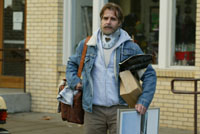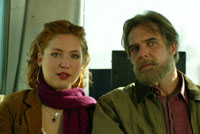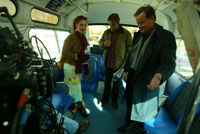
Production Notes:
Spirits were high on the first day of filming CONVERSATIONS WITH GOD. Extras, cast, and crew braved a windstorm, rain, and 50-degree weather (not to mention a 5:00 a.m. call time) to shoot a handful of scenes in the Medford Library, doubling as a Portland unemployment office.
The "stage" was set to reflect the hopelessness that permeates the dingy office, the stomping grounds for the unemployed and down-and-out. Appropriately, the building is without heat, so Czerny and cast weren't exactly faking their misery.
“It was wet, cold, and dark,” said production assistant Jackson Rowe.
Extras huddled around two large heaters like campers warming up to a fire. “Everyone was in great spirits,” said unit publicist Lisa Schneiderman, “even though it was freezing.”
Nonetheless, inspired conversation wove through the enthusiastic group of extras, on set for an all-day shoot. Half came for the chance to be involved in the making of this spiritual classic, the other half, to further their acting careers. Regardless of their reason for being there, the topic at hand became matters of the heart; spiritual topics dominated the conversation.
This scene has Neale (as played by Henry Czerny) in his neck brace, making polite banter with the doubtful caseworker. She reports that nobody is going to hire him while he’s got that “plastic bow tie” around his neck. Neale doesn't know it yet, but that excruciating pain is actually a broken neck. And it's not going to get any easier.
As Neale leaves the unemployment office, frustrated and empty-handed, the script calls for him to brush by the paintings in the hallway and knock them askew. “On the first take,” said Schneiderman, “Henry really went for it, and sent the paintings crashing to the ground. He was so surprised, and we all just cracked up.”
These early scenes in the film mark the beginning of Neale's downfall. He loses his job, he battles excruciating, unidentified pain, money grows thin, and his landlord loses patience. Before he knows it, Neale is out on the street, nothing but his most prized possession—a framed LeRoy Neiman painting—tucked under his arm.
As he steps into the street, an angry truck driver whizzes by, startling Neale and forcing him to drop his painting. Then, moments later, the truck doubles back and runs right over Neale's beloved painting. The angry truck driver is played by the father of Cinema Circle, Inc. Legal Counsel, Cynthia Litman.
Just as on-screen Neale examines the broken pieces of his most cherished prize, he looks up to find empty space where his car once stood. Utterly defeated, he rises and walks down the middle of the street, leaving behind everything of material value in his life.
As happens in the movie-making art, the scenes described above did not make the final cut! And so, much of the work on the first day of filming never found its' way to the screen.

With the early scenes of Neale’s demise wrapped, production moved to the serene setting of Ashland’s Emigrant Lake, to capture Neale in his new on-screen surroundings: a homeless encampment.
“Last night we saw shooting stars,” said Randi Brahm, location scout and manager. “It was so quiet as the sun rose over the mountain. Very quiet—magic light. It’s so wonderful being surrounded by nature.”
The lake glistened; hundreds of luminous trees surround the beautiful setting. The crew set up for a sunrise shot and prayed for the weather to cooperate as everyone continued to shiver in the crisp fall weather of Southern Oregon. Production Designer Renee Prince, Set Decorator Travis Zariwny and crew knocked themselves out to create a scene that looked exactly like a homeless camp.
“Homeless” extras settle in to the park, sleeping amidst bags full of aluminum cans, chowing down on assorted leftovers and throwaways, chatting to pass the time.
For one extra, portraying the life of a homeless person wasn’t much of a stretch. Katie was proud to be the only legitimately homeless person on the set.
She offered some insight into the plight of the local homeless population: “The majority of people who are homeless in Ashland are homeless because it’s a lifestyle choice for them,” she said. “They want to be on the outskirts of society.”
Unfortunately for the character of Neale, losing his home and setting up camp in a park was not a choice.
“These were really dark days for Neale,” said director / producer Stephen Simon, who directed the real-life Neale in Indigo, a feature film about an Indigo child and her grandfather. “I didn’t know Neale back then, but working with him on Indigo and learning as a friend about his journey out of homelessness, I know that this was the most difficult period in his life.”
Capturing this desperation on film, however, did not provide the crew’s biggest challenge while filming at Emigrant Lake. It was the weather that proved to be the biggest challenge during this six-day shoot. Between the fog and severe wind, production on many days had to end a bit early.
“Everyone loved filming in this natural environment, but we had the challenge of making a series of days look like the same day on film,” informed Rowe. “One day we had too much fog, the other, not enough. One day the winds almost blew us all over, the other, they seemed to stop just as the cameras started to roll.”
While filming in these unpredictable circumstances, Simon was glad to have Jerry McGill, the “one shot wonder” on board.
McGill was cast to play the role of Merlin, the unofficial “manager” of the homeless encampment, a role originally created as a gruff, physically imposing, intimidating character. However, when McGill rolled into the room during auditions, soft-spoken and paralyzed from the waist down, casting assistant Laurie Farley knew regardless that he was Merlin.
“He read for two minutes,” said Farley, “but I knew from the moment he entered the room that he was meant to play Merlin. He just had this light…”
McGill, who’s devoted his life to bringing awareness to physically challenged actors, was delighted to be cast in the production.
“I knew there wasn’t really a role that called for a black man in a wheelchair,” said McGill. “So I was completely overwhelmed and overjoyed when they cast me as Merlin, and totally re-created the role for me.”
As a younger actor, Jerry worked alongside Christopher Reeve in a New York theater production of “A Christmas Carol.” Farley, with a grin, said there’s serendipity at work with Simon and McGill coming together. Simon produced his first spiritual classic, Somewhere in Time, starring a young Christopher Reeve, in 1978.
“When Jerry came in to us to read for the part,” said Simon, “we all got tears in our eyes. It was simply meant to be.”
Another emotional moment unfolded when it came time to break down the set at Emigrant Lake. Neale himself came on set to assist in this process, and an alarming feeling of familiarity came over him.
As he picked up a wooden spoon used by Chef, the gregarious homeless character played by Oregon Shakespeare Festival actor Abdul Salaam El Razzac, he said it took him right back in time. He was right there, waiting for that warm meal, huddled around the fire at the camp he once lived.
“I was in a place of utter despair,” he said of his homeless experience. “But I see now that the place in which I found myself was perfect because that anger and despair put me into a space that allowed me to bring forth the Conversations with God experience.”
With that, the cast and crew left the physical locale of Neale’s on-screen desperation, and moved onward to capture the magic and hope of what transpired when Neale became aware of the messages of his heart.

Lights, camera, action—on the set of a moving bus. In this scene, a homeless but spiffed up Neale boards the bus in Ashland, where he meets a vibrant young woman named Carly, played by Zillah Glory. Carly sneaks a peek at Neale while he examines the watch of a fellow passenger.
Irritated, the fellow passenger shifts uncomfortably while Neale tries for a look at his watch. When the passenger looks away and Neale bristles, Carly realizes he is a kindred spirit.
“Yeah, I knew you were one of us,” she says.
Glory, a newcomer to the silver screen, has a magnetic presence.
“This girl is gonna have such a blazing career,” said Stephen Simon.
“She just lights up the screen. She has the most amazing comic talent,
timing and dramatic talent all in one.”
Fun fact: “Fellow passenger” and wearer of the infamous watch is
Vic Simon, winner of The Spiritual Cinema Circle’s Academy Awards contest—a
contest to name all top 14 2004 Academy Award winners, with first prize being
a trip to Ashland, OR for a walk-on role in Conversations with God.
“I feel like the ambassador of Spiritual Cinema!” he said on set. Vic, no relation to director / producer Stephen Simon, came across Stephen’s book “The Force is With You: Mystical Movie Messages that Inspire Our Lives” in the fall of 2002, and signed up for a tele-class call with him shortly thereafter. He kept abreast of Stephen’s goings on, and when The Circle launched in March 2004, Vic was one of the first to sign up.

With the bus scenes wrapped, everyone took a welcome Thanksgiving Day break. The day after, however, marked a monumental filmmaking feat. Small town Americana and Hollywood came together for the 13th annual Ashland Festival of Light as it became a scene in the movie.
“Instead of recreating and staging the festival, which we could not possibly afford, we just filmed it as it happened,” said Simon. “As a director, it was incredibly suspenseful and tremendously exciting because I couldn’t call for a second take, and have Santa start parading down the street again.”
Thankfully for Simon, the festival ran smoothly, and he captured the shot he needed as Santa flipped a switch to illuminate the entire town in a sea of twinkling Christmas lights.
Complex from a directorial and production standpoint, the scene also involved a pivotal emotional turning point in the lead character’s story. The stage was set to capture a moment in Neale’s homeless life when he nearly reached his breaking point.
In the scene, Walsch, played by Henry Czerny, drifts away from the Festival down to Lithia Creek, where he finds a young boy trailing behind his family. The young boy trips over his sleeping bag and Neale gently helps him up. With this, Walsch hopes for a moment of redemption—to be rewarded for doing a good deed—but is totally ignored and yelled at by the young boy’s angry father.
The father’s infuriated response to Neale’s appearance is yet another reminder that the bedraggled and down-on-his-luck Walsch is an outsider, and utterly unwelcome in the “real” world—much of the basis for the struggle that became his conversation with God.
Frustrated, alone, desperately disappointed, Walsch is then joined by Sunny, an earthy, mysterious local woman, played by Ingrid Boulting, who provides him with another piece of the puzzle of his life.
Just as the town is bathed in light, Sunny disappears, leaving Walsch alone again, in the midst of this otherwise joyous community celebration. It is at this moment that he makes an important promise to himself, marking a major emotional turning point in the life of the film.
“It’s a story about US,” said Czerny of the film. “It’s about how we connect, and not about one individual, but our journey, and what OUR journey has always been, and always will be.”
Relationships, and the ways in which we need others for survival, are a central theme in the film. As demonstrated by the luminous Boulting, as Sunny, who provides Neale with critical wisdom at crucial points throughout the film, we cannot make it alone.
Boulting, after a successful modeling career, was last seen on the silver screen in The Last Tycoon, but retired from Hollywood to practice and teach yoga as well as paint.
“I left Hollywood 20 years ago,” she said. “I had a love-hate relationship with the business. It wasn’t soulful enough for me and I wanted to go somewhere where I could feel things more powerfully. But acting is in my blood, and I was inspired to come back to it because I’ve always really admired Stephen and his choices—Somewhere in Time and What Dreams May Come, ” she informed.
“I feel like I’ve come home to a family of like-hearted people,” she said of being on the Conversations with God set. “It’s totally important for me to be involved in this kind of a project because I’m only interested in doing things that are meaningful, and projects that inspire me.”
